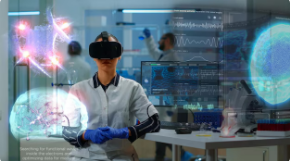The healthcare industry is experiencing a transformative revolution driven by advancements in artificial intelligence (AI). From diagnosing diseases to personalizing patient care and accelerating medical research, AI is reshaping how healthcare is delivered. This article explores the various ways AI technology is revolutionizing the healthcare industry, its benefits, and the challenges it faces.
1. AI in Disease Diagnosis
One of the most significant impacts of AI in healthcare is its ability to diagnose diseases with high accuracy. Machine learning algorithms can analyze medical images, such as X-rays, MRIs, and CT scans, to detect abnormalities that may indicate conditions like cancer, fractures, or neurological disorders. For instance, Google’s DeepMind has developed an AI system that can diagnose eye diseases as accurately as world-leading experts. Similarly, IBM’s Watson for Oncology uses AI to help oncologists identify the best treatment options based on a patient’s medical history and the latest research findings.
2. Personalized Patient Care
AI enables personalized medicine, tailoring treatment plans to individual patients based on their unique genetic makeup, lifestyle, and other factors. By analyzing large datasets of patient information, AI can predict how a patient will respond to specific treatments, allowing doctors to choose the most effective therapies. This approach is particularly beneficial in managing chronic diseases, such as diabetes and heart disease, where personalized treatment plans can significantly improve patient outcomes.
3. Enhancing Medical Research
AI is accelerating medical research by automating data analysis and identifying patterns that human researchers might overlook. For example, AI algorithms can sift through vast amounts of genomic data to identify potential targets for new drugs. This capability was crucial during the COVID-19 pandemic, where AI was used to predict virus spread, analyze the effectiveness of treatments, and even assist in vaccine development. AI-powered platforms like Atomwise use deep learning to discover new drugs faster and more cost-effectively than traditional methods.
4. Improving Patient Monitoring and Care
AI-powered wearable devices and mobile apps are transforming patient monitoring and care. These technologies can continuously track vital signs, such as heart rate, blood pressure, and glucose levels, providing real-time data to healthcare providers. This continuous monitoring allows for early detection of potential health issues, enabling timely intervention and reducing hospital readmissions. For instance, AI algorithms can analyze data from wearable devices to predict and prevent heart attacks by identifying patterns that indicate a high risk of cardiovascular events.
5. Streamlining Administrative Tasks
AI is also helping to streamline administrative tasks in healthcare, reducing the burden on healthcare professionals and improving efficiency. Natural language processing (NLP) algorithms can automate the transcription of medical notes, freeing up time for doctors to focus on patient care. AI chatbots and virtual assistants can handle routine inquiries, schedule appointments, and provide patients with information, enhancing the overall patient experience.
Challenges and Ethical Considerations
Despite the significant advancements, the integration of AI in healthcare faces several challenges. Data privacy and security are major concerns, as the use of AI involves handling sensitive patient information. Ensuring that AI systems are transparent and explainable is also crucial, as healthcare providers need to understand how AI arrives at its conclusions to trust its recommendations.
Moreover, there are ethical considerations regarding the potential for AI to exacerbate existing health disparities. AI algorithms are only as good as the data they are trained on, and if the data is biased, the AI’s recommendations may also be biased. Therefore, it is essential to ensure that AI systems are trained on diverse and representative datasets.
Conclusion
The development of AI technology in the healthcare industry holds great promise for improving patient outcomes, enhancing the efficiency of healthcare delivery, and accelerating medical research. As AI continues to evolve, it is crucial to address the challenges and ethical considerations to ensure that its benefits are realized equitably across all populations. With the right approach, AI has the potential to revolutionize healthcare, making it more precise, efficient, and accessible for everyone.











